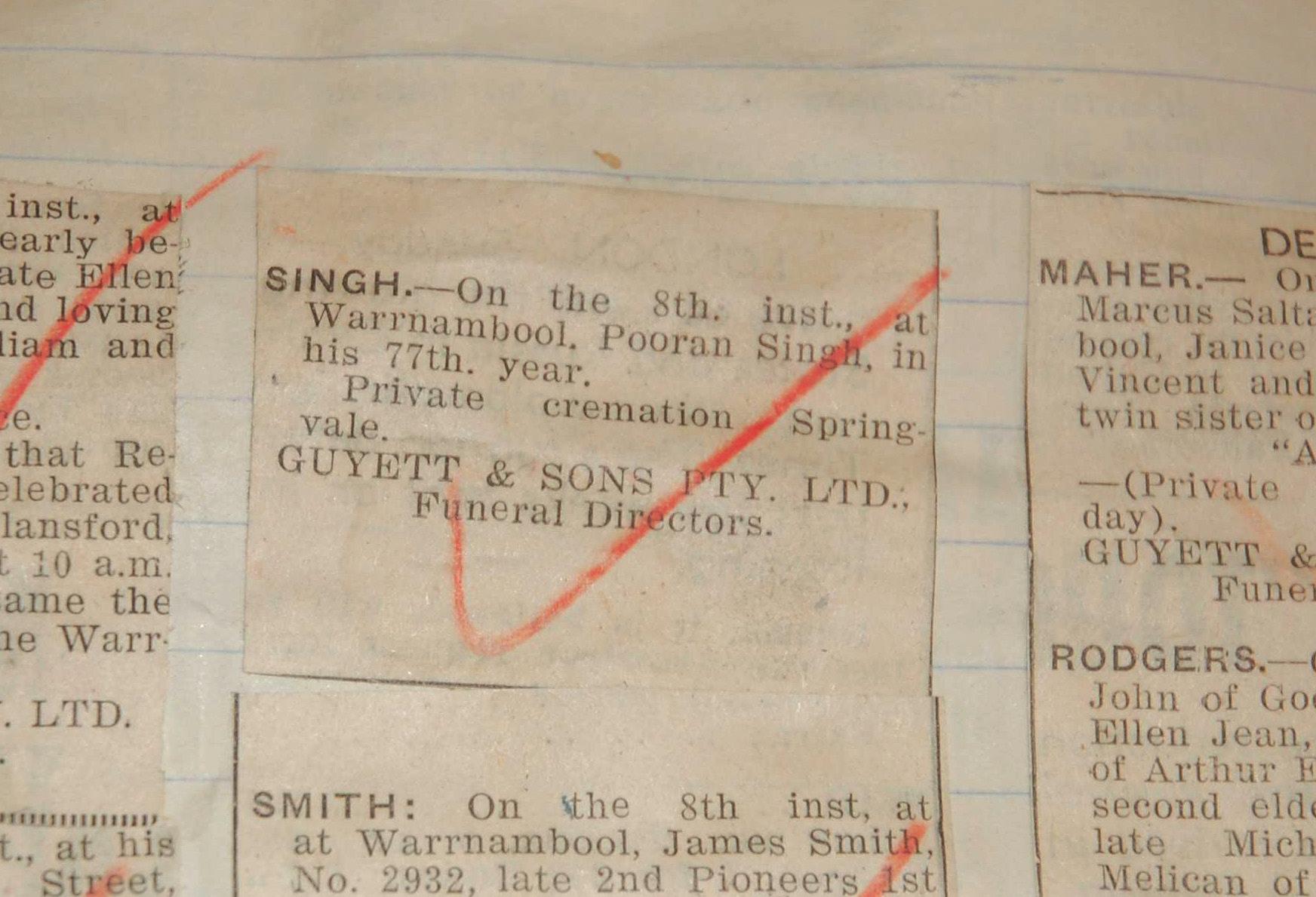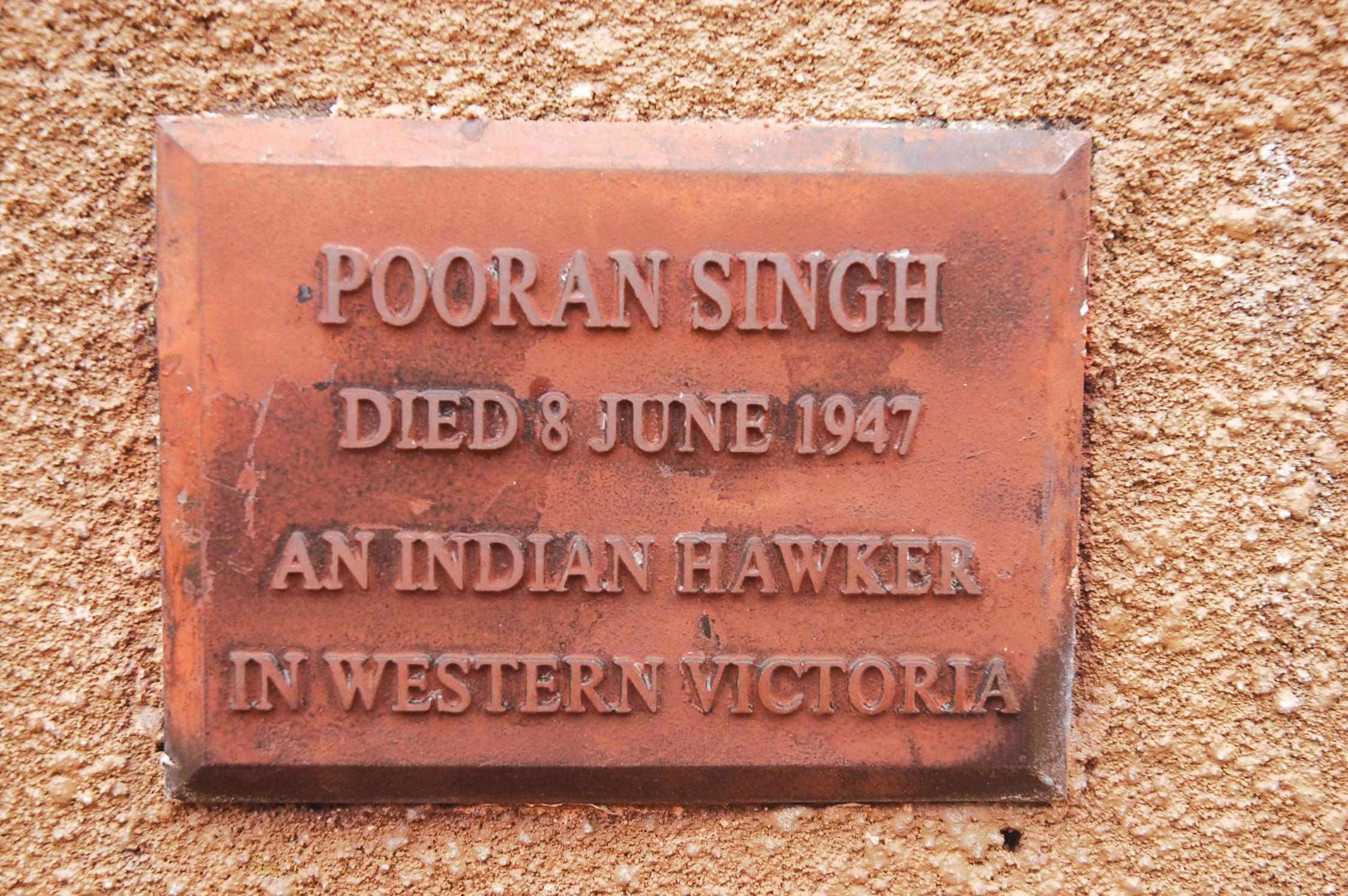
5 minute read
Pooran phoenix to rise again
from 2010-07 Melbourne
by Indian Link
He died in Victoria 63 years ago. Pooran Singh’s last wish, that his ashes be returned to India, will finally be fulfilled now
Literally out of the ashes comes a touching story about Pooran Singh, a hawker from Punjab who died in Warrnambool, Victoria 63 years ago. His last wish, that his mortal remains be returned to India to be immersed in the Ganges, looks like it will finally be fulfilled.
The family of Alice Guyett-Wood (owners of Guyett’s Funerals in Warrnambool) has preserved the ashes of Pooran Singh for 63 years – in deference to his wishes that his ashes be returned to Punjab.
Manpreet K Singh, Executive Producer of SBS Punjabi program went to Warrnambool to pursue this amazing story and spoke to Indian Link about her experience.
“I found out about Pooran Singh through Victorian researchers Len Kenna and Crystal Jordan, who found a hand-written note that mentioned his ashes,” said Manpreet. “Len and Crystal have 30 years of research between them, locating history, traces, anecdotes and memorials of Indian hawkers around Victoria. They first discovered the existence of Pooran Singh’s ashes in Warrnambool, which was followed through by SBS Radio’s Punjabi program,” she said.
According to Manpreet, Pooran Singh left Bilga in Punjab as a 30-year-old, landing on Australian shores in 1899. Like many other Punjabis at that time, he worked as a hawker, selling goods laden in his camel or horse-cart, travelling from one country town to the other. Typically, he had left his family behind in Punjab and spent the remaining 47 years of his life in county Victoria. He died on June 8, 1947 at Warrnambool & District Base Hospital,
Victoria, aged 77 years.
The family of Alice Guyett-Wood has preserved Pooran Singh’s last remains even though no one has ever come to collect his ashes for that final journey to Punjab, and they have even been accorded the pride of place at the Warrnambool cemetery.
Speaking to SBS Radio’s Punjabi program, Alice Guyett-Wood recalls that just before her father Jack Guyett died in 1986 he told her, “We should have done something about Pooran’s ashes. We should have sent them to India ...”
There is no written instruction to convey this wish, but it has been passed down generations of the Guyetts family.
When asked why they have still kept the ashes even after six decades, Alice simply says, “We didn’t have the authority to dispose them off, so we just held them. In fact, I had thought that we may even go to India one day and fulfil Pooran’s last wish.”
Pooran’s funeral was arranged by Guyetts Funerals, and perhaps Alice’s grandfather presided over the service in Warrnambool. Pooran had left instructions that he desired to be cremated, not buried; therefore, his body was sent to Melbourne by train to the only crematorium at that time, which was in the eastern suburb of Springvale.
Records at Guyett’s Funerals show that he was cremated on June 10, 1947 at 11.45am. Interestingly, the records state his religion as ‘Hindoo’ – (typically in British fashion, all from the sub-continent then were referred to as ‘hindoo’) - and that an amount of just over £53 was paid for the funeral service, which would have been roughly six month’s salary for an average hawker in those days. It must be noted that cremations were very rare back then; Pooran’s cremation seems to be the only one recorded in the year 1947 in Warrnambool.
The copy of Pooran Singh’s will shows that he had grown to be quite a wealthy man. When he died his assets amounted to £2376.04, clearly a result of many years of diligent saving. The money was distributed according to Pooran’s wishes by the executors of his will, with some money going to local residents John and Veronica Moore of Warrnambool, who presumably took care of him in the last stages of his life. He also left £50 to the Warrnambool hospital. Nearly £1,500 was sent to Punjab, with £360 apiece for each of his four nephews Gurbachan Singh, Chanan Singh, Milka Singh and Kartar Singh. The will names them as the sons of Sultani Ram (of Uppal Bhupa, Bilga), who was Pooran’s brother.
Following Manpreet’s story Pooran Singh’s kin has been traced by reporters in India. The families of Pooran Singh’s brother now live in Uppal Bhupa village in the Nurmahal area of Jalandhar district. While none of the nephews are alive today, the families of two nephews, Gurbachan and Kartar, are still settled in Uppal Bhupa according to a report in Hindustan Times. Pooran Singh’s land in the village was also distributed among his nephews. The main gate of their ancestral house is still inscribed with the words: ‘Pooran Singh, Sultani Ram (brother) of Australia’.
Speaking to Hindustan Times, Naseeb Kaur, wife of Amar Singh, recalled: “We received a telegram from Australia in 1947 informing of the death. As we could not afford to travel to Australia, a ‘bhog’ ceremony was organised in the village.”
“Money sent by Pooran Singh was received later, which was used to build this house, apart from installing a tubewell in the fields,” she added. The remaining amount was taken away by Channan Singh. His family is settled in UK and has been in touch with Manpreet recently. They are keen to be present when the ashes leave Melbourne on its final journey to India.
“After 63 years, I think it’s about time the ashes were returned,” said Alice Guyett-Wood in her interview with Manpreet on SBS Radio.
In her column for Hindustan Times and Sikh Chic Manpreet writes: ‘This Australian family has respected the last wishes of a Sikh-Aussie hawker who they didn’t even know personally. It is clear that Pooran is an integral part of their family history. Incredibly, even the trustees of the Warrnambool cemetery have extended this respect to Pooran Singh, who they regard “as their own”. In the late 1980s, they decided to commemorate Pooran’s presence in Warrnambool by installing a plaque at a memorial wall at the cemetery - his ashes are safely placed in a niche behind it. And when Alice brought up the possibility that the ashes may soon be returned to Punjab, the trustees reportedly said, ‘We’ll send the ashes back, but we’ll still keep the plaque on the niche wall, because Pooran was here!’”
“I have had overwhelming feedback on this story,” claims Manpreet. “World renowned cricketer Kapil Dev has confirmed that he will come to Melbourne and take Pooran Singh’s ashes home. Many of my listeners have offered to do the same. One of the descendants of Pooran Singh has also contacted us from UK, and phone calls and emails are pouring in from everywhere. I also spoke to Ben Whitham a World War II veteran who remembers Pooran Singh. Ben’s childhood memories of the shy, yet enterprising hawker have added interesting bits to this historical jigsaw. I have also been contacted by the Minister of Multicultural Affairs here in Melbourne, in relation to this story. I am hoping that the final homecoming of the ashes will be sorted out soon. It would be wonderful that the journey of Pooran Singh, one that he started in Punjab in the 19th century and continued in Australia in the 20th century, reaches its culmination in Punjab in the 21st century!” she added.

“I am grateful that this story has generated so much interest and I have Len to thank for initiating the process,” said Manpreet. Historian, author, playwright and public speaker Len Kenna is the author of the book, Are Indians an Ethnic Minority? Vol. 1 - Discovering Victoria, illustrated by Crystal Jordan (2008). He also penned the Indian play It Happened in Heywood about a young Sikh hawker who died in Heywood Victoria, at the beginning of the twentieth century. His main interest is researching and documenting the contributions that non-British people have made to the development of Australia.
“Both Len and me feel incidents of violent attacks against Indians in Australia may have saturated the media in recent times, but history holds a very different story, perfectly embodied in the case of Pooran Singh,” said Manpreet.
It will be a matter of time before Pooran Singh’s wishes will finally come true and his ashes will be immersed in the Ganges but this wonderful story and the memory of an Indian hawker and an Australian family’s generosity will remain with us forever.

More details of this story and interviews with Kapil Dev, Len Kenna and Alice Guyett-Wood can be found on www. sbs.com.au/punjabi









